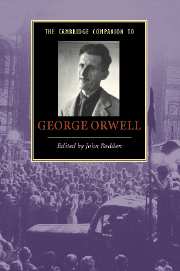Book contents
- Frontmatter
- 1 A political writer
- 2 Orwell and the biographers
- 3 Englands His Englands
- 4 The truths of experience: Orwell’s nonfiction of the 1930s
- 5 The fictional realist: novels of the 1930s
- 6 Orwell’s essays as a literary experience
- 7 ‘My country, right or left’: Orwell’s patriotism
- 8 Orwell and the British Left
- 9 Orwell, anti-Semitism and the Holocaust
- 10 Orwell, Socialism and the Cold War
- 11 Animal Farm: history as fable
- 12 Nineteen Eighty-Four: context and controversy
- 13 Orwell, the academy and the intellectuals
- 14 Orwell for today’s reader: an open letter
- 15 George Orwell: a bibliographic essay
- 16 Why Orwell still matters
- Further reading
- Index
13 - Orwell, the academy and the intellectuals
Published online by Cambridge University Press: 28 July 2007
- Frontmatter
- 1 A political writer
- 2 Orwell and the biographers
- 3 Englands His Englands
- 4 The truths of experience: Orwell’s nonfiction of the 1930s
- 5 The fictional realist: novels of the 1930s
- 6 Orwell’s essays as a literary experience
- 7 ‘My country, right or left’: Orwell’s patriotism
- 8 Orwell and the British Left
- 9 Orwell, anti-Semitism and the Holocaust
- 10 Orwell, Socialism and the Cold War
- 11 Animal Farm: history as fable
- 12 Nineteen Eighty-Four: context and controversy
- 13 Orwell, the academy and the intellectuals
- 14 Orwell for today’s reader: an open letter
- 15 George Orwell: a bibliographic essay
- 16 Why Orwell still matters
- Further reading
- Index
Summary
George Orwell is a central figure in recent debates about the relationship between contemporary academics and their publics. Since the late 1980s, the notion of the public intellectual has spread through bestselling books, the use of the term by journalists, various 'top public intellectual' contests, academic research and even a PhD programme in the 'Public Intellectual'. Long before the currently popular term 'public intellectual' was ever used, Orwell helped create and then exemplified the role of the independent 'gadfly' intellectual who writes clearly and with conviction to a general educated audience. Recent commentators on the public intellectual have not emphasised two of the most important and interesting aspects of the reception of Orwell. Orwell was not an academic, but his ideas have entered into university debates and discussion in a very substantial way without there being an Orwell 'school of thought' or a formal canonisation of him as an academic 'founder' of a discipline. Second, Orwell is at the very centre of debates about the politics of the literary critic as an 'amateur' non-professionalised vocation in this age dominated by the influence of the university professor. Each of these two questions will be discussed below, before ending on some brief thoughts on how Orwell can help us think about the possibilities of what might be called the 'global public literary intellectual'.
- Type
- Chapter
- Information
- The Cambridge Companion to George Orwell , pp. 160 - 178Publisher: Cambridge University PressPrint publication year: 2007
- 2
- Cited by



